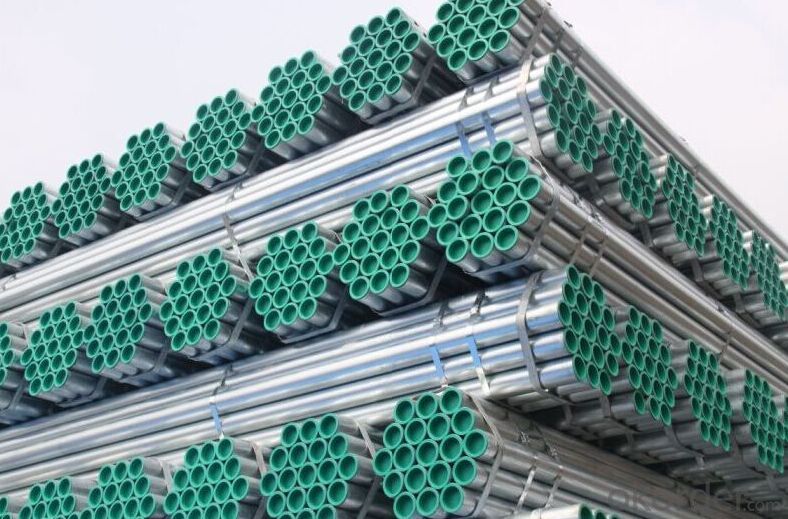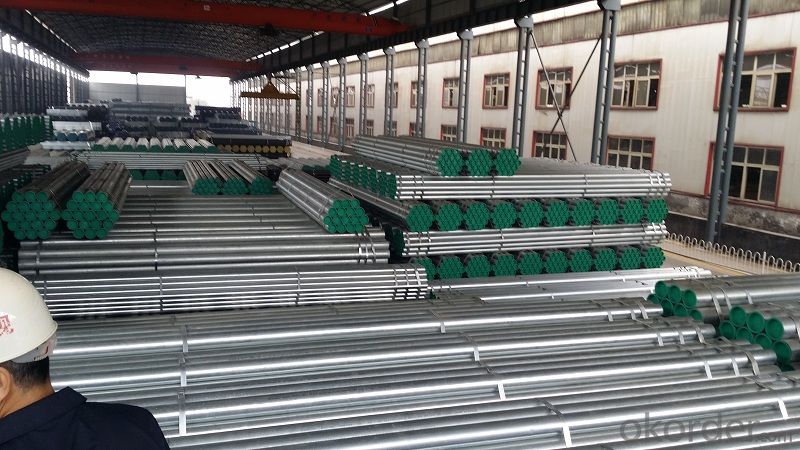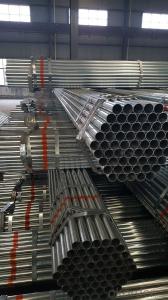Galvanized welded steel pipe for metallurgical machinery
- Loading Port:
- Shanghai
- Payment Terms:
- TT OR LC
- Min Order Qty:
- 15 m.t.
- Supply Capability:
- 12000 m.t./month
OKorder Service Pledge
OKorder Financial Service
You Might Also Like
Item specifice
1、Structure of Galvanized welded steel pipe for metallurgical machinery :
The surface of galvanized steel pipe welded steel pipe of hot dip galvanized layer or. Galvanized can increase the corrosion resistance of the steel tube, prolong service life. Galvanized pipe is widely used, in addition to water, gas, oil and other general low pressure fluid pipelines. It is also used in the petroleum industry, especially for offshore oil field of oil well pipe and oil pipe, chemical, coking equipment of oil heater, condensation cooler, coal run oil exchanger tube, and trestle pile, the mine tunnel support frame tube.
2、Main Features of Galvanized welded steel pipe for metallurgical machinery :
• High manufacturing accuracy
• High strength
• Good visual effect
• Reasonable price
3、 Galvanized welded steel pipe for metallurgical machinery Specification:
Standard | GB, DIN, ASTM ASTM A106-2006, ASTM A53-2007 |
Grade | 10#-45#, 16Mn 10#, 20#, 45#, 16Mn |
Thickness | 1 - 33 mm |
Section Shape | Round |
Outer Diameter | 21 - 610mm |
Place of Origin | Tianjin, China (Mainland) |
Secondary Or Not | Non-secondary |
Application | Hydraulic Pipe |
Technique | Cold Drawn |
Certification | API |
Surface Treatment | factory state or painted black |
Special Pipe | API Pipe |
Alloy Or Not | Non-alloy |
Length | 5-12M |
Outer Diameter | 21.3-610mm |
Grade | 20#, 45#, Q345, API J55, API K55, API L80, API N80, API P110, A53B |
Standard | ASME, ASTM |
1) Material:Q195 Q235 Q345 X42 X52
2) Specification range:OD:21.3-610mm,WT:6-70mm,length:6-12m or according to the requirement of clients.
3) Excutive standards:GB,ASME API5L.ASTM A 106/A53,Despite of the above standards,we can also supply seamless steel pipe with standard of DIN,JIS,and so on,and also develop new products according to the requirements of our clients!
4) Surface: galvanized.
5) Ends:Beveled or square cut,plastic capped,painted.
6) Packing:bundles wrapped with strong steel strip,seaworthy packing.
4、Packaging & Delivery
Packaging Details: | seaworthy package,bundles wrapped with strong steel strip |
Delivery Detail: | 15-30days after received 30%TT |
5、FAQ of Galvanized welded steel pipe for metallurgical machinery :
①How is the quality of your products?
Our products are manufactured strictly according to national and internaional standard, and we take a test
on every pipe before delivered out. If you want see our quality certifications and all kinds of testing report, please just ask us for it.
Guaranteed: If products’ quality don’t accord to discription as we give or the promise before you place order, we promise 100% refund.
②How about price?
Yes, we are factory and be able to give you lowest price below market one, and we have a policy that “ for saving time and absolutely honest business attitude, we quote as lowest as possible for any customer, and discount can be given according to quantity”,if you like bargain and factory price is not low enough as you think, just don’t waste your time.Please trust the quotation we would give you, it is professional one.
③Why should you chose us?
Chose happens because of quality, then price, We can give you both.Additionally, we can also offer professional products inquiry, products knowledge train(for agents), smooth goods delivery, exellent customer solution proposals.Our service formula: good quality+good price+good service=customer’s trust
SGS test is available, customer inspection before shipping is welcome, third party inspection is no problem.
6、 Galvanized welded steel pipe for metallurgical machinery Images:


- Q:Can steel pipes be used for offshore oil and gas platforms?
- Yes, steel pipes can be used for offshore oil and gas platforms. Steel pipes are commonly used in offshore oil and gas platforms due to their durability, strength, and resistance to harsh marine environments. These pipes are typically made of high-grade steel alloys that can withstand the extreme pressures and temperatures associated with offshore drilling and production activities. Furthermore, steel pipes are versatile and can be easily welded, allowing for the construction of complex pipeline networks on offshore platforms. Additionally, steel pipes can be coated with protective coatings such as epoxy or anti-corrosion coatings to enhance their resistance to corrosion and extend their lifespan in the offshore environment. Overall, steel pipes are a reliable and widely used choice for transporting oil and gas on offshore platforms.
- Q:How are steel pipes used in the construction of oil-fired power plants?
- Steel pipes are used in the construction of oil-fired power plants for various purposes such as transporting oil, steam, and hot gases, providing structural support, and ensuring efficient heat transfer. They are used for oil and fuel supply lines, steam and water circulation systems, exhaust gas systems, and other critical infrastructure where high pressure and high temperatures are involved. The durability, strength, and corrosion-resistant properties of steel pipes make them an ideal choice for such applications, ensuring the safe and reliable operation of oil-fired power plants.
- Q:What are the different types of steel pipe unions?
- Various industries and applications commonly utilize several types of steel pipe unions. Some of the most frequently used types are as follows: 1. Threaded Union: This union features female threads on both ends, facilitating easy attachment to two male threaded pipes. It ensures a reliable connection that is resistant to leaks. 2. Socket Weld Union: On one end, this union has a socket, while the other end is equipped with a female threaded connection. It is specifically designed for socket welding, where the pipe is inserted into the socket and then welded around the joint, resulting in a robust and long-lasting connection. 3. Butt Weld Union: This specific union is employed for joining two pipes with butt weld ends. It necessitates beveling the pipes and subsequently welding them together, creating a sturdy and permanent connection. 4. Compression Union: Typically used for connecting pipes made of softer materials like copper or plastic, compression unions consist of a compression nut and a compression ring. These components are tightened onto the pipe, ensuring a tight and secure seal. 5. Flanged Union: This union is equipped with flanges on both ends, allowing it to be bolted onto two flanged pipes. Flanged unions are commonly utilized in applications where easy disassembly and reassembly are necessary. 6. Grooved Union: Grooved unions possess grooves on their ends, which are utilized for connecting pipes by inserting them into the grooves and securing them with a coupling. They are often utilized in fire protection systems and other applications where quick installation and easy maintenance are of utmost importance. These examples represent only a fraction of the numerous types of steel pipe unions available. The selection of a union depends on the specific requirements of the application, such as the pipe material, size, and operating conditions. Seeking advice from a professional or consulting industry standards can aid in determining the most suitable union for a particular project.
- Q:What are the factors affecting the cost of steel pipes?
- There are several factors that can affect the cost of steel pipes. Some of the main factors include the price of raw materials, such as iron ore and coal, which are used in the steel manufacturing process. Additionally, the cost of labor, transportation, and energy can also impact the overall cost of steel pipes. Market demand and competition within the industry can also influence prices. Finally, factors such as government regulations, trade policies, and currency exchange rates can also play a role in determining the cost of steel pipes.
- Q:Can steel pipes be used for nuclear power plants?
- Yes, steel pipes can be used for nuclear power plants. Steel pipes are commonly used in the construction of nuclear power plants for various purposes such as transporting coolant, steam, and other fluids. Steel pipes offer excellent strength, durability, and resistance to high temperatures and pressure, making them suitable for the demanding conditions of nuclear power plants.
- Q:Can the KBG25 steel tube hold 4 six types of cables?
- The specification specifies that the duty ratio of multiple conductors through the pipe laying shall not exceed 20%, and the straight-line distance shall not exceed 30 meters. The distance shall be shortened by the elbow, and the specifications or handbooks can be checked in detail
- Q:What are the different types of connections used with steel pipes?
- There are several types of connections commonly used with steel pipes, including threaded connections, welded connections, flanged connections, and grooved connections.
- Q:How are steel pipes insulated?
- Steel pipes are commonly insulated using a variety of materials such as fiberglass, mineral wool, or foam insulation. These insulating materials are typically wrapped around the steel pipes to prevent heat loss or gain, as well as to protect against corrosion and condensation. Additionally, a vapor barrier may be applied to further enhance the insulation performance.
- Q:How are steel pipes tested for leaks?
- Steel pipes can be tested for leaks using various methods, including hydrostatic testing, pneumatic testing, and using leak detection equipment such as ultrasonic testing or helium testing.
- Q:Can steel pipes be used for underground water supply networks?
- Yes, steel pipes can be used for underground water supply networks. Steel pipes are durable, resistant to corrosion, and have high strength, making them suitable for carrying water underground. Additionally, steel pipes can withstand high pressure and temperature variations, ensuring a reliable and long-lasting water supply system.
1. Manufacturer Overview |
|
|---|---|
| Location | |
| Year Established | |
| Annual Output Value | |
| Main Markets | |
| Company Certifications | |
2. Manufacturer Certificates |
|
|---|---|
| a) Certification Name | |
| Range | |
| Reference | |
| Validity Period | |
3. Manufacturer Capability |
|
|---|---|
| a)Trade Capacity | |
| Nearest Port | |
| Export Percentage | |
| No.of Employees in Trade Department | |
| Language Spoken: | |
| b)Factory Information | |
| Factory Size: | |
| No. of Production Lines | |
| Contract Manufacturing | |
| Product Price Range | |
Send your message to us
Galvanized welded steel pipe for metallurgical machinery
- Loading Port:
- Shanghai
- Payment Terms:
- TT OR LC
- Min Order Qty:
- 15 m.t.
- Supply Capability:
- 12000 m.t./month
OKorder Service Pledge
OKorder Financial Service
Similar products
New products
Hot products
Related keywords






























